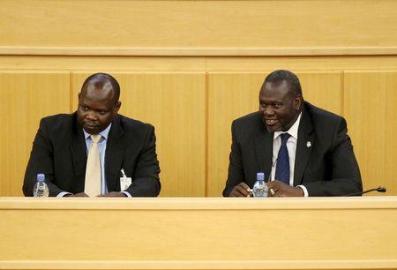Juba warns against foreign imposed peace deal with rebels
August 18, 2015 (JUBA) – South Sudanese government under president Salva Kiir warned on Tuesday that it would not be bound by an agreement imposed by the foreign powers, citing resistance for implementation if it is not accepted.

Minister Lomuro explained that the president declined to sign a peace deal proposed by regional leaders on Monday because it did not incorporate reservations made by the government in the letter which president Salva Kiir sent to the Ethiopian prime minister in his capacity as the chairperson of the East African regional bloc, the Intergovernmental Authority on Development (IGAD. IGAD has been mediating the talks between the two main warring parties and other South Sudanese stakeholders in the more than 20 months of deadly conflict.
Meanwhile, minister of foreign affairs and international cooperation, Barnaba Marial Benjamin, said in a separate interview that he was surprised the revised version did not reflect consensuses he had reached with most of the foreign ministers from the IGAD member countries during his recent regional tour preaching peace messages and position of his government on the draft proposal.
At the Eastern African Pan African Congress held in Nairobi, Kenya, last Thursday, Marial said he had met regional leaders and deliberated on the South Sudan issue during which the leaders allegedly expressed their commitment to supporting the position of the government on the proposal.
“The fact is that what has come out of the summit does not demonstrate the spirit of the recent mini-summit held in Uganda, not even a single reflection of the views and opinions of the government and the people of South Sudan which I personally shared with members at the Eastern African Pan African Congress held in Nairobi, Kenya,” said Marial, who felt let down by the regional leaders.
He further explained that in those meetings the government stated it position and concerns with leaders from the region that the peace agreement should not be imposed by IGAD mediation.
“We affirmed our commitment to bringing the conflict to an end but we said clearly that [for] the peace to be successful, it must not be imposed. We told them clearly a peace that is imposed will have a lot of challenges during implementation and which [we] did not want them to happen, he said. We want a peace will be supported by the people and own it themselves,” he said.
The top diplomat in the country said the president declined to sign the peace because he did not want the people to see the agreement as it is the deal between the government and the armed opposition group.
“The president did not sign it because he is answerable to the people because they are the ones who elected him and the people he will have to consult to see their views during the period of 15 days. What the people will say will be basis of the response,” he added.
Following the adoption of a revised version in Kampala by the IGAD leaders last week, Juba expressed its willingness to ink the version of 11 August immediately while the rebels criticized it.
The concern of the government came back again when the IGAD Plus reverted to the original proposal of 24 July which the two parties were previously given 10 days to consult on with their respective constituencies.
Meanwhile the South Sudanese armed opposition leader, Riek Machar, together with the ruling party (SPLM) reinstated secretary general, Pagan Amum and representatives of the various civil society organizations of youth, women and faith based groups signed the peace agreement on Monday.
Observers say the South Sudanese president was facing threats from army generals who had been against a peace deal, hoping to score military victory instead.
Fighting erupted on 15 December 2013 when president Kiir accused his former deputy, Machar, of allegedly planning a coup against him. The rebel leader dismissed the accusations saying the president wanted to use the allegation against his opponents who were calling for political reforms in the country.
(ST)
